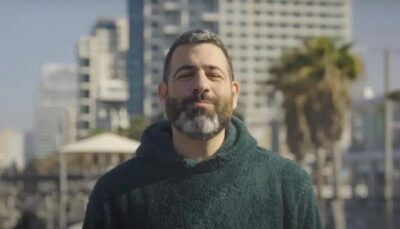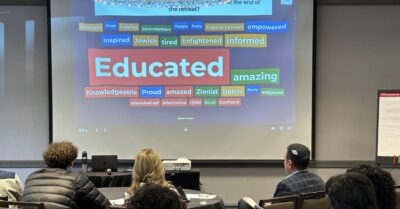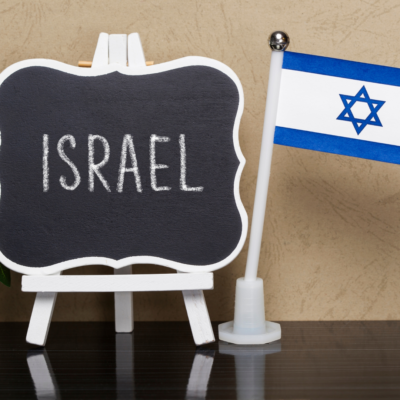Two years ago, during the height of the pandemic, Miriam Munz, the interim CEO and education chair at the Zionist Federation of Australia (ZFA), asked me if I would be willing to trek across the globe to speak at ZFA’s education conference.
At the time, all I could think about was how I could manage to help lead OpenDor Media while simultaneously helping my kids do school work at home. The last thing on my mind was a 20-hour flight to Australia two years down the road.
But Miriam has been around longer than I have and knew how to think about the future. So, two years later, my wife and I left our three little ones with family, jetted from Newark to Melbourne, and spent the next two weeks meeting with community leaders and activists.
On the flight back home, I was reading Walter Russell Mead’s tome, “The Arc of a Covenant” (I had a lot of time on the flight back). Mead observes in the book that, in the U.S., Israel is discussed in a way that is often “angry, accusatory, and simplistic.”
It made me reflect on the differences between the U.S. and Australia in how we talk about Israel and Zionism. There was something about their Zionism that I wanted to import back to the U.S.
After presenting at the ZFA conference and meeting with teachers and students at various schools — like Moriah College, Emanuel School and Masada College in Sydney and Mt. Scopus College, Bialik College and Leibler Yavneh College in Melbourne, and Carmel Academy in Perth — I had time to reflect. Here are some of those reflections and what we can all learn from the Australian Jewish community.
1. There is a need — both in and out of the classroom — for smart, thoughtful content about Judaism and Israel that has no barrier for entry.
Many of the educators I met regularly incorporate videos, articles, podcasts and resources from Unpacked for Educators in their classrooms. In fact, one of the common refrains I heard from teachers in Australia was, “We use Unpacked ALL THE TIME in our classrooms!”
They were simply grateful for the content and tools we create to engage students in Israeli history, Jewish history, current events and Judaism in ways that resonate with young people. And many teachers asked me if we could create new resources on specific topics.
It reminded me just how much this content is needed both in and out of the classroom. In Australia, it’s estimated that approximately 50% of Jewish students attend Jewish day school (compared to approximately 20% in America). Additionally, many young people are part of Bnei Akiva (“Bnei” as they call it) or Habonim Dror, while others get their primary Jewish and Israel education in places like YouTube, TikTok and Instagram.
Regardless of the setting, whether it’s a physical classroom, a youth movement or a social media platform, wherever Jewish and Israel education is happening, there’s a need for great educational content.
We ought to broaden our understanding of education to include the full range of settings where young people are learning. We ought to invest in creating high-quality content to educate and inspire our students. And, we ought to ensure that Zionist education is included in the Judaic studies curriculum. In Australia, I saw how Zionist education was part and parcel of Jewish education, and not distinct from it. The very name of the forum I presented at — the Zionist Federation of Australia’s Jewish Educators’ Conference — illustrates this.
This is something we can “import” from Australia to the rest of the Jewish world. Zionist education is not something merely to make time for, but to invest in.
2. We cannot hide the unsavory moments in Israeli history from our students. We must include multiple narratives — including the voices of Palestinians and Arab citizens of Israel — in Israel education.
Time and time again, during my trip, students and teachers said they want a robust Zionist and Israeli history education, which includes Palestinian voices and multiple narratives (or at least more than “the case FOR Israel”). On this point, there is essentially consensus.
The educators and students have spoken and although there are a number of foundations that acknowledge this need, it is my continued hope that the major philanthropists of the world will continue to follow suit. In some ways, it’s almost boring to hear at this point. Nearly everyone in the field has spoken.
No longer is “We’ve been perfect and there are no complications to the story” going to work as an approach to Israel education. Enough ink has been spilled on this topic, and yet, I still hear some ambivalence in some voices every now and then.
If there is one thing I am sure about, it’s that hiding our unsavory moments as a people in an age of Google and social media is about as effective as herding cats or spitting in the wind.
Our students are asking to be trusted that they can be both passionate about their Judaism and Zionism and that they can ask tough questions. Some of these questions may have really good retorts and others are “teikus” (unresolved questions).
This is not to say that advocacy does not have a place. Of course, advocacy and lobbying for any number of causes is worthy. But let’s once and for all remove advocacy from the educational context of a classroom. Instead, let’s allow our students to uncover, excavate and explore Israeli history and current events in all of their complexity.
3. We ought to learn about a different type of Zionist discourse that is deep, thoughtful and respectful.
Too often in the U.S., the Zionist discourse falls into binary thinking (which I am describing in only slightly exaggerated terms). It goes something like this: You either support Zionism, vote on the political right and endorse every Israeli policy, or you reject Zionism, vote on the political left and criticize every Israeli policy.
You are either a staunch Zionist or you are an anti-Zionist and there aren’t a lot of clear options in between. Making things worse, this overly simplistic thinking is often accompanied by vitriol and defensiveness rather than a genuine willingness to listen and learn.
In Australia, I saw a different way to talk about and think about Zionism. For example, in one session led by Ron Weiser, who previously served as ZFA president, I saw a number of young Jewish adults have a respectful, thoughtful dialogue about whether a two-state solution is still possible. There was no defensiveness. There was curiosity.
Besides “mate,” the word “And” stood out to me in Australia. To paraphrase from Russell Mead again, almost every educator and student I spoke to embraced the following sentence: “I am glad that the State of Israel exists, and I am devastated about the tragedy that befell the Palestinian people.”
Of course, the Australian Jewish community is not monolithic and there is no single type of Zionist discourse in every school or classroom. This is certainly not to paint the entire community with a broad brush, and of course they have a sincere desire to continue improving.
But my conversations with leaders and funders in the community lead me to believe that we ought to learn from Australian Jews about embracing the full complexity of Zionist thought and debate.
Instead of waking up as Democrats or Republicans, it seemed to me that they woke up as Australians. Instead of seeing Zionism as black and white (or red and blue), let’s promote a Zionism that is complex and has many colors.
Let’s promote an understanding of Zionism as a broad tent, or even multiple micro-tents with different portals and access points for entry. Let’s learn how to talk about Zionism in a way that is deep, thoughtful and respectful. As educators, let’s encourage our students to explore and ask tough questions.
4. From Melbourne to London and Los Angeles, the Jewish community has shared goals and challenges. We ought to shrink the Jewish world and learn together.
Over and over again, through conversations with principals and leaders in the community, it became clear to me that Jewish educators in Australia and the U.S. have common goals.
For example, we all want Judaism to be deeply relevant for our students. We want our students to be well-versed in Zionist thought and Israeli history. We want to promote critical thinking and analysis in our classrooms.
Looking beyond Australia and America, I believe that most Jewish educators and institutions around the world — regardless of their political affiliation, religious denomination or geographic location — have these similar goals as well.
And we ought to work together to achieve the objectives we all share. Why? Imagine how much stronger each of our communities would be if we were to connect with our Jewish colleagues around the world, build community and discuss ideas in an intentional way.
Our Collaborative program, which connects Jewish educators from all over the world, and from different denominations and political orientations, is doing this. One of the reasons why we have this program, which is led by Avi Posen and Sarah Gordon, is to make sure we are all learning from each other.
We can all connect and develop a common language through this content and curriculum, learn together, and then bring this into our classrooms.
5. We ought to expand partnerships between the Australian and American Jewish communities.
For all of the reasons above, and others, there is so much the American Jewish community can learn from the Australian Jewish community. Australian and American Jews ought to work together and learn from each other. We ought to invest more in the relationship between our communities.
There is the concept of Jewish “peoplehood,” or in Hebrew, “Amiut.” We often talk about peoplehood in the context of American Jewry and Israeli Jewry, the countries where 80-90% of world Jewry resides.
But there is so much to be gained by having Jews from the U.S. meet Jews from Australia. It is an opportunity to build common ground, to build a common literacy and knowledge, and to explore together what the next stage of Zionism and the Jewish people will look like.





